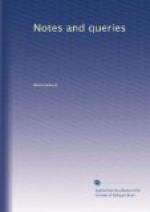I have in vain consulted the glossaries within my reach,—Ducange, Spelman, Halliwell, for the meaning of the terms dustpot and forlot (or, as spelt in another Compotus, dustpot and forthlot). They appear to have been customary payments to the servants who had the care of the carts and carriages belonging to the manor, which, at the time of this particular Compotus, were not payable by the lord, because the demesne lands were in farm; and these dues were paid by the tenant. A reference to the Promptorinm Parvulorum (a further instalment of which I rejoice to learn, from Mr. Way’s communication, in No. 15., is in a state of progress) has been equally unproductive. The editorial note to the communications inserted in No. 17., on the interpretation of Pokership, induces me to send you this query, in the hope of eliciting information, if not from the gentleman you there refer to, at least from some one or other of your numerous readers learned in Archaic words.
I may, at a future period trouble you with some further remarks arising out of the same Compotus.
G.A.C.
Tracts attributed to Eachard.—The writer of this article has long had in his possession an old volume (among many others of a like kind in his collection) published in 1685; and containing the following tracts:—1st. “The Grounds and Occasions of the Contempt of the Clergy,... in a letter written to R.L., 9th edition.” This letter is signed T.B. 2nd. “Observations upon the Answer to the Inquiry, &c., in a second Letter from T.B. to R.L.” 3rd. “Hobbes’ State of Nature, considered, in a Dialogue between Philautus and Timothy;” the “Epistle Dedicatory” is signed, J.E. 4th. “A Letter to his Old Dear Friend R.L. from T.B.” 5th. “A Letter to B.D.,” the publisher of Mr. Herbert’s Country Parson, from T.B. 6th. “A Letter to the Author of the Vindication of the Clergy,” from T.B. 7th. “A Letter to T.D.,” the Author of Hieragonisticon, or Corah’s Doom, from T.B. 8th. “A Letter to I.O. from T.B.”
Now, it is mentioned in Dr. Hooke’s Ecclesiastical Biography (vol. iv., art. Eachard), that Eachard was the author of these tracts. But the queries I would beg to propose, if any of your correspondents can answer them, are these:—1st. Why does Eachard sign himself T.B.; does that signature allude to any matter in particular? 2nd. Who are meant by the other letters, R.L., B.D., L.O., &c.; and who, if any persons in particular, by Philautus; and Timothy; and who was the author of Hieragonisticon.
Perhaps “Philau_tus_” should be rather be “Philau_tos_,” and may mean “Hobbes” himself, as a self-sufficient person, and a great admirer or lover of himself. I wish these queries may not be thought too insignificant for your periodical, which to me, and so many others, is of peculiar interest and value.
GEO. WYATT (Clerk.)
Burghwallis, 1850.




